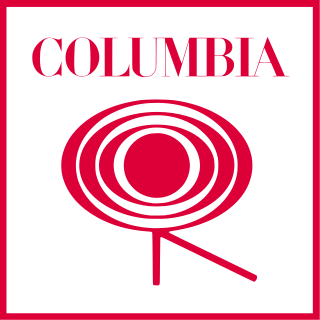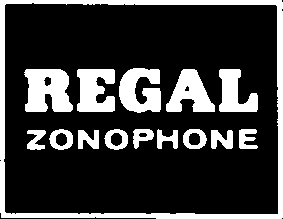
An extended play (EP) is a musical recording that contains more tracks than a single but fewer than an album or LP record. Contemporary EPs generally contain up to six tracks and have a playing time of 15 to 30 minutes. An EP is usually less cohesive than an album and more "non-committal".

Columbia Records is an American record label owned by Sony Music Entertainment, a subsidiary of Sony Corporation of America, the American division of multinational conglomerate Sony. Columbia is the oldest surviving brand name in the recorded sound business, and the second major company to produce records. From 1961 to 1991, its recordings were released outside North America under the name CBS Records to avoid confusion with EMI's Columbia Graphophone Company. Columbia is one of Sony Music's four flagship record labels: Epic Records, and former longtime rivals, RCA Records and Arista Records as the latter two were originally owned by BMG before its 2008 relaunch after Sony's acquisition alongside other BMG labels.

The Victor Talking Machine Company was an American recording company and phonograph manufacturer, incorporated in 1901. Victor was an independent enterprise until 1929 when it was purchased by the Radio Corporation of America (RCA) and became the RCA Victor Division of the Radio Corporation of America until late 1968, when it was renamed RCA Records.

Brunswick Records is an American record label founded in 1916.

Coleman Randolph Hawkins, nicknamed "Hawk" and sometimes "Bean", was an American jazz tenor saxophonist. One of the first prominent jazz musicians on his instrument, as Joachim E. Berendt explained: "there were some tenor players before him, but the instrument was not an acknowledged jazz horn". Hawkins biographer John Chilton described the prevalent styles of tenor saxophone solos prior to Hawkins as "mooing" and "rubbery belches". Hawkins denied being first and noted his contemporaries Happy Caldwell, Stump Evans, and Prince Robinson, although he was the first to tailor his method of improvisation to the saxophone rather than imitate the techniques of the clarinet. Hawkins' virtuosic, arpeggiated approach to improvisation, with his characteristic rich, emotional, and vibrato-laden tonal style, was the main influence on a generation of tenor players that included Chu Berry, Charlie Barnet, Tex Beneke, Ben Webster, Vido Musso, Herschel Evans, Buddy Tate, and Don Byas, and through them the later tenormen, Arnett Cobb, Illinois Jacquet, Flip Phillips, Ike Quebec, Al Sears, Paul Gonsalves, and Lucky Thompson. While Hawkins became known with swing music during the big band era, he had a role in the development of bebop in the 1940s.

OKeh Records is an American record label founded by the Otto Heinemann Phonograph Corporation, a phonograph supplier established in 1916, which branched out into phonograph records in 1918. The name was spelled "OkeH" from the initials of Otto K. E. Heinemann but later changed to "OKeh". In 1965, OKeh became a subsidiary of Epic Records, a subsidiary of Sony Music. OKeh has since become a jazz imprint, distributed by Sony Masterworks.

Columbia Graphophone Co. Ltd. was one of the earliest gramophone companies in the United Kingdom.

Imperial Records is an American record company and label started in 1947 by Lew Chudd. The label was reactivated in 2006 by EMI, which owned the label and back catalogue at the time. Imperial is owned by Universal Music Group.

Regal Zonophone Records was a British record label formed in 1932, through a merger of the Regal and Zonophone labels. This followed the merger of those labels' respective parent companies – the Columbia Graphophone Company and the Gramophone Company – to form EMI. At the merger, those records from the Regal Records catalogue were prefixed 'MR' and those from the Zonophone Records catalogue were prefixed 'T'. Record releases after the merger continued using only the 'MR' prefix.
Discography is the study and cataloging of published sound recordings, often by specified artists or within identified music genres. The exact information included varies depending on the type and scope of the discography, but a discography entry for a specific recording will often list such details as the names of the artists involved, the time and place of the recording, the title of the piece performed, release dates, chart positions, and sales figures.

PYE or Pye Records is an independent British record label. It was first established in 1955 and played a major role in shaping rock 'n' roll and pop music history. The Pye name was dropped in 1980 due to trademark issues, after which it produced almost no music until the company name and trademark was acquired by the Scottish broadcaster and music producer, Tony Currie, in September 2024.

Bluebird Records is an American record label best known for its low-cost releases, primarily of children's music, blues, jazz and swing in the 1930s and 1940s. Bluebird was founded in 1932 as a lower-priced subsidiary label of RCA Victor. Bluebird was noted for what came to be known as the "Bluebird sound", which influenced rhythm and blues and early rock and roll. It is currently owned by RCA Records parent company Sony Music Entertainment.

Bethlehem Records was an American jazz independent record label, founded by Gus Wildi in 1953.

Prestige Records is a jazz record company and label founded in 1949 by Bob Weinstock in New York City which issued recordings in the mainstream, bop, and cool jazz idioms. The company recorded hundreds of albums by many of the leading jazz musicians of the day, sometimes issuing them on subsidiary labels. The company's began releasing jazz records in 78 and 45 RPM formats in 1950. The Prestige label includes the 13000 and 25000 cat# series. Prestige International was a sub-label of Prestige, active from 1960 to 1969, that mostly released folk music. In 1971, the company was sold to Fantasy, which was later absorbed by Concord.
Columbia Masterworks was a record label started in 1924 by Columbia Records. In 1980, it was separated from the Columbia label and renamed CBS Masterworks. In 1990, it was revived as Sony Classical after its sale to the Sony Corporation.
Embassy Records was a UK budget record label that produced cover versions of current hit songs, which were sold exclusively in Woolworths shops at a lower price than the original recordings. The original label was active between 1954 and 1965, after which it disappeared when its parent company, Oriole, was taken over by CBS Records.
Pickwick Records was an American record label and British record distributor known for its budget album releases of sound-alike recordings, bargain bin reissues and repackagings under the brands Design, Bravo, Hurrah, Grand Prix, and children's records on the Cricket and Happy Time labels.

Elvis for Everyone! is a compilation album by American singer and musician Elvis Presley, issued by RCA Victor in mono and stereo, LPM/LSP 3450, on August 10, 1965. Recording sessions took place over a ten-year span at Sun Studio in Memphis, RCA Studio B in Nashville, Tennessee, and Radio Recorders in Hollywood, California. It peaked at number 10 on the Top Pop Albums chart.
RCA Camden was a budget record label of RCA Victor, originally created in 1953 to reissue recordings from earlier 78rpm releases. The label was named "Camden", after Camden, New Jersey where the offices, factories and studios of RCA Victor and its predecessor, the Victor Talking Machine Company had been located since 1901.
Budget albums were low-priced vinyl LPs of popular and classical music released during the 1950s to 1970s consisting either of previously released material or material recorded especially for the line. Prices ranged from as low as 59 U.S. cents to $2.98. In the UK Pickwick Records' Top of the Pops record series, which operated between 1968 and 1985, was the most successful budget album range.














